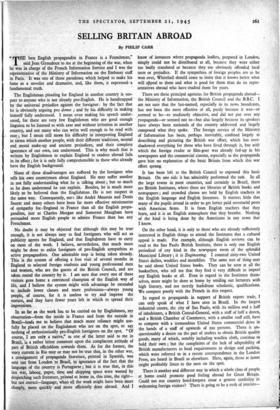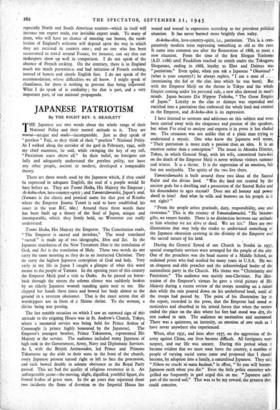SELLING BRITAIN ABROAD
By PHILIP CARR "THE best English propagandist in France is a Frenchman,"
said Jean Giraudoux to me at the beginning of the war, when he was in charge of the French Information Service and I was the representative of the Ministry of Information on the Embassy staff in Paris. It was one of those paradoxes which helped to make his fame as a novelist and dramatist, and, like them, it expressed a fundamental truth.
The Englishman pleading for England in another country is sus- pect to anyone who is not already pro-English. He is handicapped by the universal prejudice against the foreigner : by the fact that he is obviously arguing pro domo ; and by his difficulty in making himself fully understood. I mean even making his speech under- stood, for there are very few Englishmen who are good enough linguists to be listened to with ease and without irritation in another country, and not many who can write well enough to be read with ease ; but I mean still more his difficulty in interpreting England in terms which another people, with their different traditions, mental and moral make-up and ancient prejudices, and their complete ignorance of our own, can understand. This is why much that is written by Englishmen to explain England to readers abroad fails in its effect ; for it is only fully comprehensible to those who already have the English background.
None of these disadvantages are suffered by the foreigner who tells his own countrymen about England. He may suffer another in not fully understanding what he is talking about ; but so much as he does understand he can explain. Besides, he is much more likely to be believed than the Englishman. He is not suspect in the same way. Consequently, melt like Andre Maurois and Denis Saurat and many others have been far more effective missionaries of sympathy for -England in France than all the English propa- gandists, just as Charles Morgan and Somerset Maugham have persuaded more English people to admire France than has any Frenchman.
No doubt it may be objected that although this may be true' enough, it is not always easy to find foreigners who will act as publicity agents for England, and that Englishmen have to carry on most of the work. I believe, nevertheless, that much more might be done to enlist foreigners of pro-English sympathies as active propagandists. One admirable step is being taken already. This is the system of offering a free visit of several months in • England to selected foreign students and young professional men and women, who are the guests of the British Council, and are taken round the country by it. I am sure that every one of these visitors goes home a convinced champion of the English way of life, and I believe the system might with advantage be extended to include lower classes and more professions—always young people, of course, for it is useless to try and impress the mature, and they have fewer years left in which to spread their impressions.
In so far as the work has to be carried on by Englishmen, my observation—from the inside in France and from the outside in Brazil—leads me to believe that much more reliance might use- fully be placed on the Englishmen who are on the spot, to say nothing of enthusiastically pro-English foreigners on the spot. "Of course, I am only a native," as one of the latter said to me in Brazil, is a rather bitter comment upon the complacent attitude of part of British officialdom towards them. As for the former, the story current in Rio may or may not be true that, in the other war, a consignment of propaganda literature, printed in Spanish, was sent out from London to Brazil, in ignorance of the fact that the language of the country is Portuguese ; but it is true that, in this last war, labour, paper, time and shipping space were wasted by despatching such literature, printed at home in, this time, the right— but not correct—language, when all the work might have been more cheaply, more quickly and more efficiently done abroad. And I
know of instances where propaganda leaflets, prepared in London, simply could not be distributed at all, because they were either too badly translated or because they too obviously offended local taste or prejudice. If the sympathies of foreign peoples are to be won over, Whitehall should cease to insist that it knows better what will appeal to them and what is good for them than do its repre- sentatives abroad who have studied them for years.
There are three principal agencies for British propaganda abroad— the Ministry of Information, the British Council and the B.B.C. I am not sure that the last-named, especially in its news broadcasts, has not been the most effective of all, partly because it was—or .seemed to be--so studiously objective, and did not put over any propaganda—or seemed not to—but also largely because its speakers have always been nationals of the country addressed and largely composed what they spoke. The foreign service of the Ministry of Information has been, perhaps inevitably, confined largely to describing and picturing the British war effort, which has over- shadowed everything for those who have lived through it, but with which the foreign reader or film-goer was already fed-up in his newspapers and the commercial cinema, especially as the propaganda gave him no explanation of the basic Britain from which this war effort sprang.
It has been left to the British Council to expound this basic Britain. On one sidc it has admirably performed the task. In all the large towns in most countries, and certainly in Brazil, there are British Institutes, where there are libraries of British books and newspapers ; and crowded classes are held by English teachers in the English language and English literature. It matters little that many of the pupils attend in order to get better paid secretarial posts with American firms. It is from English teachers that they learn, and it is an English atmosphere that they breathe. Nothing of the kind is being done by the Americans in any town that I know.
On the other hand, it is only to those who are already sufficiently interested in English things to attend the Institutes that a cultural appeal is made. For example, although English reviews can be read at the Sao Paulo British Institute, there is only one English periodical of any kind in the newspaper room of the splendid Municipal Library ; it is Engineering. I counted sixty-two United States dailies, weeklies and monthlies. The same sort of thing may be said about United States books. They can be seen at all the booksellers, who tell me that they find it very difficult to import any English books at all. Even in regard to the Institutes them- selves, more might be done at home by sending out lecturers with high literary, and not merely humdrum scholastic, qualifications. We compare poorly with the French in this respect.
In regard to propaganda in support of British export trade, I can only speak of what I have seen in Brazil. In the largest industrial centre, the city of Sao Paulo, with its million and a half of inhabitants, a British Consul-General, with a staff of half a dozen, and a British Chamber of Commerce, with a smaller staff still, have to compete with a tremendous United States commercial drive in the hands of a staff of upwards of zoo persons. There is un- questionably a desire on the part of traders to obtain British quality goods, many of which, notably including woollen cloth, continue to hold their own ; but the complaints of the lack of adaptability of British manufacturers to local requirements in design and packing, which were referred to in a recent correspondence in the London Press, are heard in Brazil as elsewhere. Here, again, those at home might profitably listen to the men on the spot.
There is another and different way in which a whole class of people at home could promote good feeling abroad for Great Britain. Could not our country hotel-keepers show a greater cordiality in welcoming foreign visitors? There is going to be a rush of toutists-- especially North and South American tourists—which in itself will increase our export trade, our invisible export trade. To many of them, who will have no chance of entering our homes, the recol- lection of England's welcome will depend upon the way in which they are received in country inns ; and no one who has been accustomed to tray.l around France, for instance, can say that our innkeepers show up well in comparison. I do not speak of the absence of French cooking. On the contrary, there is in England much too much pretentio is and bad imitation of French cooking, instead of honest and simple English fare. I do not speak of the accommodation, whose difficulties we all know. I might speak of cleanliness, for there is nothing to prevent that being improved. What I do speak of is cordiality ; for that is part, and a very important part, of our national propaganda.























 Previous page
Previous page